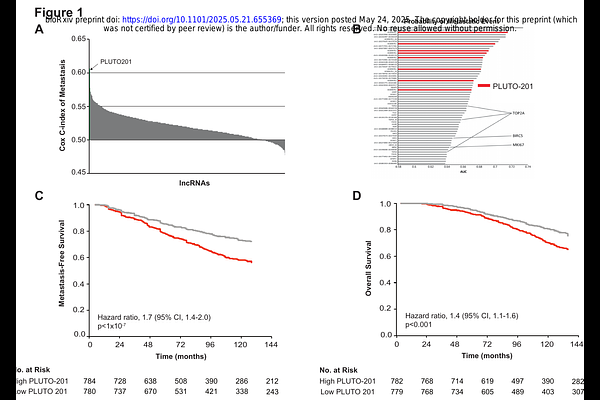Identification and Characterization of PLUTO-201, a Novel Long Non-Coding RNA Associated with Poor Outcomes in Prostate Cancer

Identification and Characterization of PLUTO-201, a Novel Long Non-Coding RNA Associated with Poor Outcomes in Prostate Cancer
Li, H.; Younger, N. S.; Malik, B.; Shin, H. J.; Zhang, C.; Niknafs, Y.; Zhao, S.; Wilder-Romans, K.; Pitchiaya, S.; Han, S.; Barnard, T. J.; Lloyd, P.; Zhang, M.; Chesner, L. N.; Calvert, M.; Egusa, E. A.; Zhu, J.; Chou, J.; Das, R.; Kothari, V.; Shenoy, T.; Diolaiti, M. E.; Malik, R.; Prensner, J. R.; Burlingame, A. L.; Ashworth, A.; Chinnaiyan, A. M.; Feng, F.; Li, H.
AbstractDespite extensive investigation, the factors promoting aggressive prostate cancer are poorly understood. By performing a comprehensive analysis of whole-genome transcriptome data to identify differential expression across 1,567 patients with prostate cancer, we now report the identification of a novel lncRNA, Prostate Locus of Uncharacterized Transcript Outlier 201 (PLUTO-201), which is strongly associated with metastasis and poor overall survival in men with prostate cancer. We find that overexpression/knockdown of PLUTO-201 in pre-clinical models of prostate cancer modulates proliferation rates and markers of an aggressive phenotype through regulation of steroid biosynthesis and expression of the MHC class I complex, driving increased growth in androgen-depleted conditions and decreased susceptibility to T cell-mediated cytotoxicity. We further find that the heterogeneous nuclear ribonucleoprotein hnRNPK directly binds PLUTO-201 and is indispensable for its activity. Overall, our findings indicate that PLUTO-201 is a driver of aggressive prostate cancer phenotypes and poor clinical outcomes.